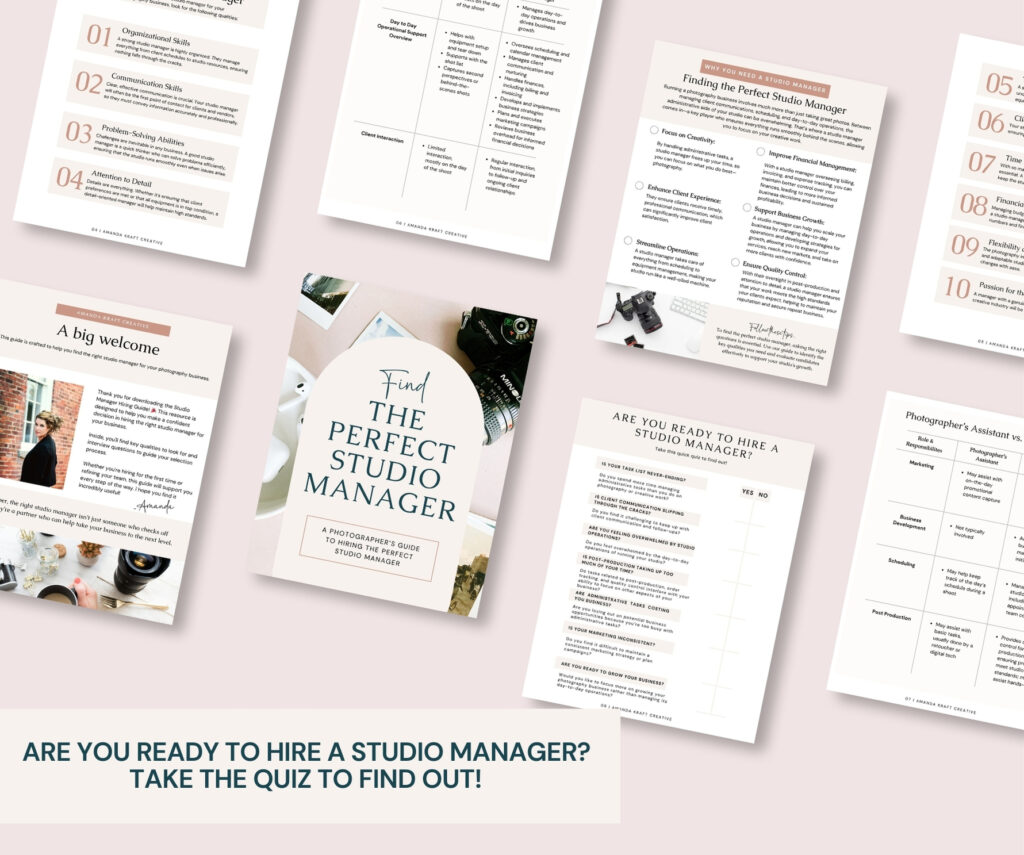Browse around
Hey Photographer!
I’m a Virtual Studio Manager, Creative Business Strategist, and former photographer turned operational powerhouse.
I'm Amanda
With a no-BS approach, a can-do attitude, and my loyal fur missile, Oakley, by my side, I’m here to help you cut through the noise and build a business that works as hard as you do. Let’s take those big, scary dreams and turn them into real, tangible wins—one bold move at a time
Master the Art of In-Person Sales
FOR PHOTOGS
Free Guide: Find the Perfect Studio Manager
VIRTUAL SUPPORT
3 Mistakes I Made in My Photography Business
REAL TALK
What I am Currently Reading
EVERY DAY LIFE
Find the Perfect Studio Manager for Your Photography Business

Posted In
August 9, 2024
Posted On
Running a successful photography studio is about much more than capturing stunning images. Behind every thriving studio is a well-organized, resourceful, and efficient studio manager who keeps the wheels turning smoothly. Whether you’re a wedding photographer managing multiple clients per month or a portrait photographer juggling a packed shooting schedule, having a capable studio manager can be the key to a well-oiled operation.
In this post, we’ll explore the essential qualities that make a studio manager truly effective and give you a handy checklist to help you find the perfect match for your business.
Why the Perfect Studio Manager Is Essential for Your Photography Business
As a creative professional, your heart lies in photography—capturing moments, telling stories, and creating art. But let’s be honest, running a business involves so much more, from managing schedules and client communications to handling billing and logistics. The demands can quickly pull you away from the work you love. That’s where a studio manager comes in.
An effective studio manager is your behind-the-scenes powerhouse, enabling you to:
- Focus on Creativity: By managing the day-to-day operations, a studio manager frees you up to concentrate on what you do best—creating amazing photos.
- Enhance Client Experience: With your studio manager handling client inquiries, scheduling, and follow-ups, your clients get prompt and professional communication, leading to a top-notch experience.
- Streamline Operations: A great studio manager ensures that everything from equipment management to vendor coordination runs smoothly, making your studio more efficient and effective.
- Increase Profitability: With the operational side taken care of, you can direct your energy towards growing your business and pursuing creative projects that drive profitability.
Now that we’ve established just how vital a studio manager is, let’s dive into the key qualities that define an exceptional one.

Key Qualities of an Effective Studio Manager
Strong Organizational Skills
A studio manager with stellar organizational skills is invaluable. They keep track of everything—schedules, client details, equipment inventory—ensuring nothing slips through the cracks.
Example: Your studio manager should be adept at using tools like Asana, Trello, or Studio Ninja to create and maintain systems for tracking appointments, equipment usage, and client information. This ensures that everything runs smoothly, even during your busiest seasons.
Excellent Communication
In any business, communication is key, but in a creative environment, it’s critical. Your studio manager must be able to clearly and effectively communicate with clients, vendors, and team members, ensuring everyone is on the same page.
Example: Whether it’s confirming a shoot with a client, coordinating with a makeup artist, or updating you on the day’s schedule, your studio manager should convey information clearly and professionally. This clarity helps avoid misunderstandings and keeps projects on track.
Problem-Solving Abilities
Challenges are inevitable, but a good studio manager is a quick thinker who can resolve issues efficiently. Whether it’s dealing with a last-minute cancellation, a technical glitch, or a logistical hiccup, they should handle it with grace and get things back on track.
Example: Imagine a key piece of equipment malfunctions just before a shoot. A problem-solving studio manager would quickly arrange for a backup or find an alternative solution, ensuring the shoot goes off without a hitch.
Attention to Detail
In photography, details are everything. Your studio manager needs to have an eagle eye for detail, ensuring that every aspect of your business, from client contracts to the final image delivery, is handled meticulously.
Example: A detail-oriented studio manager will double-check that all props are ready for a shoot, that client preferences are noted and adhered to, and that contracts are thoroughly reviewed before signing. Their attention to detail helps maintain the high standards your studio is known for.
Technical Proficiency
While your studio manager doesn’t need to be a photographer, having a solid understanding of photography equipment, editing software, and studio operations is a huge advantage. This technical knowledge allows them to assist with setups and troubleshoot issues as they arise.
Example: A studio manager familiar with Adobe Lightroom or Photoshop can help with basic editing tasks or image culling, streamlining your workflow and freeing you up to focus on more creative work.
Client-Centric Approach
Your studio manager will often be the first point of contact for your clients, so it’s crucial that they have a client-centric mindset. They should handle inquiries with professionalism, manage expectations, and ensure that clients feel valued and heard.
Example: A client-centric studio manager goes the extra mile, whether it’s by sending a thoughtful follow-up email after a shoot or ensuring that all client preferences are meticulously noted and adhered to. This approach leads to happy clients and repeat business.
Time Management Skills
With so many tasks to juggle—multiple shoots, client meetings, and administrative duties—a studio manager must be a master of time management. They should prioritize tasks effectively, ensuring that deadlines are met and nothing falls through the cracks.
Example: A studio manager with strong time management skills will organize your day efficiently, allowing you to focus more on your creative work and less on logistics. This ensures your time is spent where it’s most valuable—behind the camera.
Financial Acumen
A studio manager often handles billing, invoicing, and budgeting, so a good grasp of financial management is essential. They should be able to manage cash flow, track expenses, and ensure the financial side of your business runs smoothly.
Example: A financially savvy studio manager can help set up and manage payment plans for clients, track expenses for tax purposes, and assist in budgeting for upcoming projects, contributing to the overall financial health of your business.
Flexibility and Adaptability
The photography industry is fast-paced and ever-changing. An effective studio manager needs to be flexible and adaptable, ready to pivot and adjust to whatever comes their way.
Example: If a client requests a last-minute change to their shoot, a flexible studio manager will accommodate the request without missing a beat, ensuring everything goes smoothly and the client is happy.
Passion for the Industry
Lastly, a great studio manager should have a genuine passion for photography. This passion translates into a deep understanding of your needs and the ability to anticipate challenges before they arise.
Example: A studio manager who loves the industry will stay updated on the latest trends, seek out new opportunities for growth, and bring creative ideas to the table, helping your studio stay ahead of the curve.

Checklist: Finding the Perfect Studio Manager for Your Photography Business
Here’s a handy checklist to help you identify the qualities of an effective studio manager:
- Organizational Skills
- Proficient in project management tools (e.g., Asana, Trello, Studio Ninja).
- Keeps track of appointments, equipment, and client information.
- Communication Skills
- Clearly conveys information to clients, vendors, and team members.
- Professional and responsive in all communications.
- Problem-Solving Abilities
- Thinks quickly and finds solutions to unexpected challenges.
- Maintains composure in high-pressure situations.
- Attention to Detail
- Thoroughly reviews contracts and client information.
- Ensures all aspects of a shoot are properly organized.
- Technical Proficiency
- Familiar with photography equipment and software (e.g., Adobe Lightroom, Photoshop).
- Able to assist with basic technical setups and troubleshooting.
- Client-Centric Approach
- Prioritizes client satisfaction and goes the extra mile.
- Handles client inquiries and feedback professionally.
- Time Management Skills
- Prioritizes tasks effectively and meets deadlines.
- Manages both their own time and the photographer’s time efficiently.
- Financial Acumen
- Manages billing, invoicing, and budgeting.
- Tracks expenses and assists with financial planning.
- Flexibility and Adaptability
- Adjusts to changing circumstances quickly and effectively.
- Handles last-minute changes with ease.
- Passion for the Industry
- Stays updated on industry trends and best practices.
- Brings creative ideas to improve studio operations.
Finding the right studio manager can be a transformative step for your photography business, allowing you to focus on what you do best—capturing stunning images and creating memorable experiences for your clients. By looking for these key qualities and using the checklist provided, you’ll be well on your way to hiring a studio manager who can elevate your studio to the next level.
Remember, an effective studio manager is not just an assistant; they are a crucial partner in your business’s success. Whether you’re overwhelmed with administrative tasks, looking to enhance client experiences, or aiming to scale your operations, the right studio manager can make all the difference.

Don’t forget to download my exclusive guide to help you find the perfect studio manager for your photography business!
Pin
Share
Leave a Reply Cancel reply
Marketing Guide for Photographers
FREEBIE
Wedding Photographer
Social Media Templates
NEW IN THE SHOP
Find the Perfect Studio Manager
Freebie
Master the Art of In-Person Sales
For Photogs
3 Mistakes I made in My Photography Business
real talk
EVERY DAY LIFE
What I am Currently Reading
You May Also
Previous Story
next Story
I'm so glad you're here, stick around, there's so much to see,
xo, Amanda